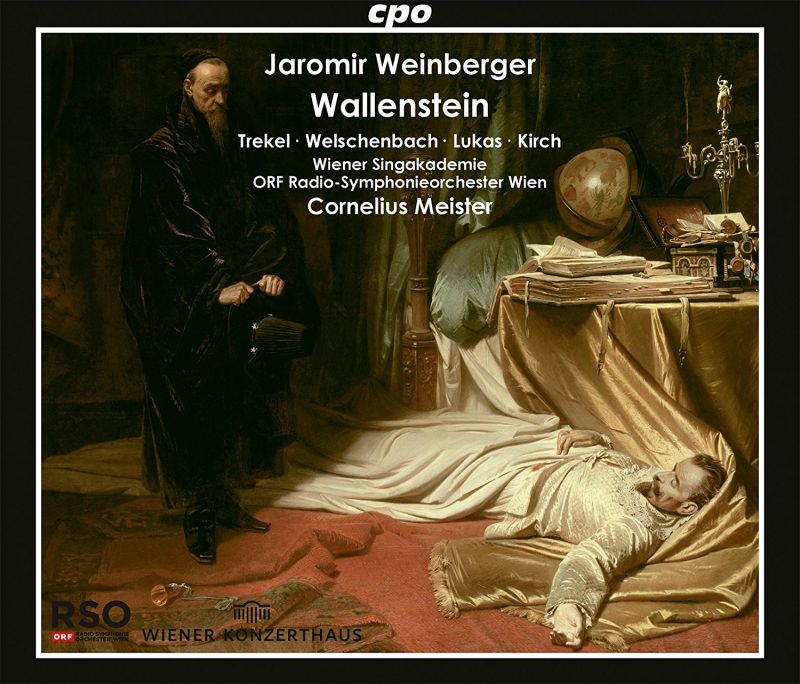WEINBERGER Wallenstein
View record and artist detailsRecord and Artist Details
Composer or Director: Jaromír Weinberger
Genre:
Opera
Label: CPO
Magazine Review Date: 05/2018
Media Format: CD or Download
Media Runtime: 130
Mastering:
DDD
Catalogue Number: CPO777 963-2

Tracks:
| Composition | Artist Credit |
|---|---|
| Wallenstein |
Jaromír Weinberger, Composer
Benno Schollum, Wrangel Claudia Goebl Cornelius Meister, Conductor Dagmar Schellenberger, Countess Terzky, Soprano Daniel Kirch, Max Piccolomini, Tenor Dietmar Kerschbaum Edwing Tenias, Illo, Bass-baritone Georg Lehner, Butler, Baritone Jaromír Weinberger, Composer Johannes Schwendinger Martina Welschenbach, Thekla, Soprano Nina Berten Oliver Ringelhahn Ralf Lukas, Octavio Piccolomini, Bass-baritone Roman Sadnik, Count Terzky, Tenor Roman Trekel, Wallenstein, Baritone Vienna Radio Symphony Orchestra Vienna Singakademie Chorus |
Author: Peter Quantrill
The composer of Schwanda the Bagpiper is, on the surface of it, a scarcely more plausible candidate for doing justice to an epic historical tragedy which ran to 10 hours when Peter Stein produced it complete in 2007. Condensed to a little over a fifth of that length by Weinberger, his librettist Miloš Kareš and Max Brod, the back-translator of this German version, the opera suffers from a pervasive sense of strain in several directions. The focal point of Schiller’s prologue (Wallenstein’s Camp, the subject of a vivid tone-poem by Weinberger’s countryman Smetana) is a moral tirade against Wallenstein’s plundering troops delivered by a capuchin monk. On CD, he’s just another angry bass. To the title-figure is granted an ‘Uneasy lies the head’ monologue of crumbling power, but it arrives too early in the piece and is over before Wallenstein or our understanding of him can develop through its course; here is no Henry IV, or for that matter Wotan or Boris, even if they cast fleeting shadows over both music and text.
At the opera’s first run of only four performances in Vienna, November 1937, critics turned Weinberger’s very versatility against him, and it is tempting to share their reservations over a score that jumps neurotically from scene to scene and even phrase to phrase between military pomp and parody, orchestrally stripped-back visions of Korngold and Puccini, and the operetta style that was the composer’s stock-in-trade, largely reserved here for the romantic subplot which falls short of counterbalancing a preponderance of plotting and barking generalissimi.
Just over a year later, Weinberger sought to put aesthetic clear water between himself and Alban Berg, just as he had done physically by emigrating to the US: ‘He was a composer of decadence. I am a composer of the past … This time, the time in which we are living, has nothing to say to me and I do not expect it ever to say anything.’ Yet a further irony is that Wallenstein belongs to its time as wholly as Lulu, premiered in Berlin five months earlier. How literally it may be read as an allegory (Albrecht Wallenstein as Engelbert Dollfuss, decorated soldier, reformer and dictator, eventually murdered by those professing loyalty to the higher authority of the Emperor/Hitler) remains open to question, but Weinberger’s dedication of the opera to Kurt Schuschnigg, Dollfuss’s successor, does not. Neither does the Nazis’ construction of Buchenwald on the very site of Wallenstein’s camp earlier that year.
In the Schiller anniversary year of 2009, a staged revival in Gera obtained international attention; this one-off concert performance (recorded without applause) hits and misses the mark much like Wallenstein itself. The most compelling portrayal comes from Roman Trekel in the title-role, and he does a passable Tauber imitation in the fifth of the opera’s six scenes (‘Komm an mein Herz’) when Weinberger snaps into operetta mode. In the part of the general’s daughter Thekla, Martina Welschenbach sings attractively until the part climbs high above the stave, which is often enough to provoke discomfort all round. Dagmar Schellenberger stands out as the scheming Countess Terzky, but too many of the large supporting cast are indistinguishably dry and declamatory where juicier voices are needed. Chorus, orchestra and conductor all deserve credit for bringing conviction and a modicum of coherence to a tricky and intermittently absorbing piece.
Discover the world's largest classical music catalogue with Presto Music.

Gramophone Digital Club
- Digital Edition
- Digital Archive
- Reviews Database
- Full website access
From £8.75 / month
Subscribe
Gramophone Full Club
- Print Edition
- Digital Edition
- Digital Archive
- Reviews Database
- Full website access
From £11.00 / month
Subscribe
If you are a library, university or other organisation that would be interested in an institutional subscription to Gramophone please click here for further information.




